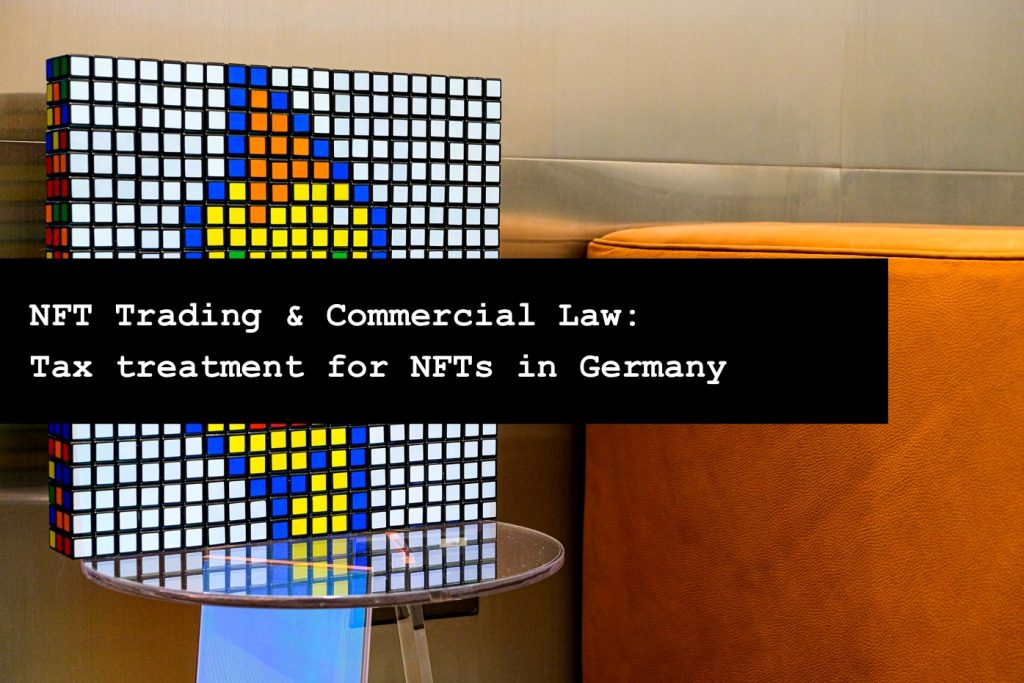
Inhaltsverzeichnis
- 1 NFT trading and taxation in Germany
NFT trading and taxation in Germany
How the taxation of NFTs work and how you don’t run into the risk of evading taxes.
After the boom of cryptocurrencies in the last decade, the internet is currently on NFT trading. We have already described what NFTs are and how their ownership rights are structured in a previous article (only in German).
This article is about the tax treatment of Non-Fungible Tokens in Germany.
At the outset, it should be noted that there are still no binding lax law requirements when trading NFTs. Only a few initial considerations are made here.
Production (Minting) of NFTs and trading
If you are a manufacturer of a NFT, it depends for taxation purposes whether you manufacture these NFTs on a freelance basis as an artist (for example, NFT characters in the context of NFT computer games) or whether you manufacture and trade commercially. As a freelancer, you have to perform a self-creative activity with a certain level of design in the manufacturing process, § 18 German Income Tax Act. Commercial production is to be assumed, however, if you e.g., distribute the NFTs in the online trade independently (self-distribution) or instead of only selling, also buy.
The boundaries are almost fluid. It always depends on the concrete individual case, but the commercial nature is generally disadvantageous from a tax standpoint. Among other things because trade tax must be paid.
Tax-free sale of NFTs – private trading
Like cryptocurrencies, NFTs have so far been classified by the Federal Ministry of Finance as other economic goods within the meaning of Section 23 I 1 No. 2 German Income Tax Act. Accordingly, the sale of NFTs has the character of a private sale transaction.
One way to sell NFTs tax-free as a private person would be to use the exemption limit of 600 euros per year, which applies to all gains from private sales transactions (gold, cryptocurrencies, art, etc.). If you are below 600 euros in total at the end of the year with all sales, no taxes are due. If you are just one cent above that, the entire sum of the private disposal transactions must be taxed at your personal income tax rate.
A second way to sell NFTs tax-free is to keep the holding period to one year. If you have held the NFT in your Wallet for one year, the sale, in whatever amount, is tax-free. However, be sure to make a note of the purchase date to avoid mistakes.
As with all private sales transactions, you can offset losses within the same year, carry losses forward or carry them back if no gains were made in that year.
Commerciality, sales tax & money laundering law for NFT trading
In order to classify trading in NFTs as commercial, the delimitation criteria to securities and foreign exchange trading of the German Federal Fiscal Court could be used. The principles applied, which are also applied by the German Federal Ministry of Finance in a draft letter on the taxation of cryptocurrencies: Entwurf eines BMF-Schreibens: Einzelfragen zur ertragsteuerrechtlichen Behandlung von virtuellen Währungen und von Token.
It may be that these principles will soon find corresponding application to NFTs. There are high requirements to be met in terms of commerciality. Acting as a trader or acting in a manner typical of a bank would be necessary. It is not enough simply to have sold a large number of NFTs; rather, there must be concrete indications of commercial activity. These would be the use of a business operation set up in a commercial manner and a short-term and frequent turnover using borrowed capital. In each case, the individual case must be considered.
If commerciality has been established, trade tax must be paid. This is normally 7-18%. In addition, commercial NFT traders cannot make tax-free profits, as profits are taxed regardless of the holding period. But losses can be more easily offset.
As for sales tax, it may soon apply to trading NFTs. Unlike cryptocurrencies, which are considered a means of payment and are not subject to sales tax, NFTs could be taxed with the sales tax as soon as the trader is considered an entrepreneur in terms of sales tax law and the transaction can be classified as a supply or other service in Germany. However, it is also decisive who buys the NFTs or where the buyer is located. This could still become problematic since the trade with NFTs is mostly carried out via pseudonyms.
As a commercial NFT trader, you could fall within the scope of the Money Laundering Act as a goods trader and would have to comply with the due diligence, risk management, and other obligations contained therein. Otherwise, even frivolous violations could result in heavy fines.
Do you have more questions regarding German NFT taxes and regulations?
Do you still have questions about the tax treatment of NFTs, or are there uncertainties about the possible obligation under money laundering law? Send us a message or call our office at 04202 / 6 38 37 0 or send us an e-mail to: Do you still have questions about the tax treatment of NFTs, or are there uncertainties about the possible obligation under money laundering law? Send us a message to info@rechtsanwaltkaufmann.de or call our office at 04202 / 6 38 37 0. We will take care of your concerns and, if necessary, take legal action on your behalf.
Für die deutsche Version dieses Artikels folgen Sie bitte diesem Link:
The information contained in these articles is for general information purposes and does not relate to the specific situation of any individual. It does not constitute legal advice. In a specific individual case, the present content cannot replace individual advice from expert persons.
Questions and Answers regarding NFT tax regulations in Germany
References to NFT trading regulations in Germany
- https://www.winheller.com/bankrecht-finanzrecht/non-fungible-tokens/besteuerung-nft.html
- https://www.stuttgarter-nachrichten.de/inhalt.nft-steuerfrei-verkaufen-mhsd.15085f4b-cc45-4bc3-afa6-0272ec1ba024.html
- https://www.cmshs-bloggt.de/steuerrecht/ertragssteuerliche-behandlung-sog-non-fungible-token/



